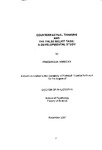COUNTERFACTUAL THINKING AND THE FALSE BELIEF TASK: A DEVELOPMENTAL STUDY
| dc.contributor.author | ARRECKX, FREDERIQUE | |
| dc.contributor.other | Faculty of Science and Engineering | en_US |
| dc.date.accessioned | 2013-09-16T12:07:09Z | |
| dc.date.available | 2013-09-16T12:07:09Z | |
| dc.date.issued | 2007 | |
| dc.identifier | NOT AVAILABLE | en_US |
| dc.identifier.uri | http://hdl.handle.net/10026.1/1758 | |
| dc.description.abstract |
The main aim of this thesis was to investigate children's reasoning abilities, especially their ability to solve counterfactual tasks. This thesis studied counterfactual thinking as an independent ability but also in relation to both types of the false belief tasks that measure theory of mind and contrary-to-fact syllogisms. Four experiments were conducted with typically developing children between the ages of 3 to 5. The first experiment studied the difference between affirmative and negative counterfactual questions and found that the former was easier than the latter. The second experiment replicated these results and investigated the link between counterfactual thinking and the false belief task but failed to find a link between the two. The third experiment found a link between counterfactual and both types of false belief tasks; false belief to others and false belief to self task. This experiment also identified a discrepancy between counterfactual thinking and contrary-to-fact syllogisms. When examining contrary-to-fact syllogisms it was found that the ones requiring a yes answer were easier than the ones requiring a no answer. This discrepancy between counterfactual thinking and contrary-to-fact syllogisms was confirmed in experiment 4 as a fantasy context influenced performance on these tasks differently. Fantasy context increased performance on contrary-to-fact syllogisms but decreased performance on counterfactual tasks. In conclusion, this thesis confirmed a link between counterfactual thinking and the false belief task. It identified an important difference between counterfactual thinking and contrary-to-fact reasoning. It also highlighted the importance of the polarity (affirmative versus negative) of questions as well as answers on performance. | en_US |
| dc.language.iso | en | en_US |
| dc.publisher | University of Plymouth | en_US |
| dc.title | COUNTERFACTUAL THINKING AND THE FALSE BELIEF TASK: A DEVELOPMENTAL STUDY | en_US |
| dc.type | Thesis | |
| plymouth.version | Full version | en_US |
| dc.identifier.doi | http://dx.doi.org/10.24382/4506 |
Files in this item
This item appears in the following Collection(s)
-
01 Research Theses Main Collection
Research Theses Main


